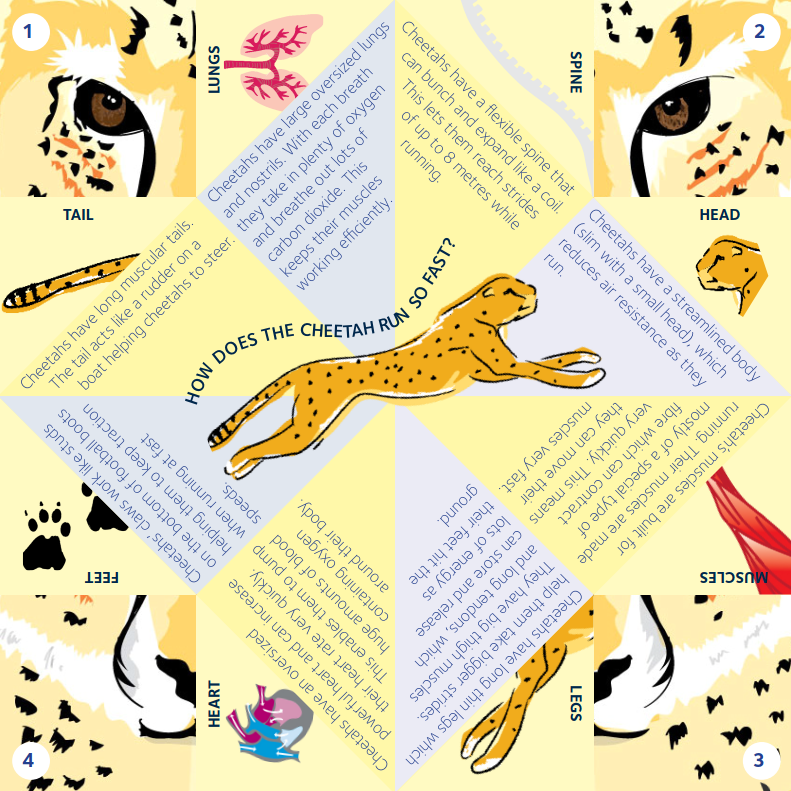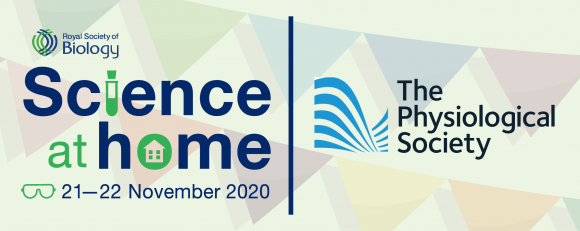The Physiological Society
The Physiological Society is the largest network of physiologists in Europe.
Physiological research helps us to understand how the body works in health and determine what goes wrong in disease, facilitating the development of new treatments and guidelines for maintaining human and animal health.
Follow The Physiological Society's animations, vlogs, and download our fun activities to learn more about the science of life! Understand more about what physiology is, what physiologists do, and how human and animal bodies work.
Make your own brain hat | Zone 1: the world around us
Assemble a colourful wearable hat that shows different parts of the brain.
Cheetah Cootie Catcher | Zone 1: the world around us

Use this fun little fortune teller to learn interesting facts about the cheetah.
Race to Sleep | Zone 2: broadening your horizons
This board game activity helps highlight the lifestyle behaviours required to have a good night’s sleep and maintain healthy well-being.
The Circadian Body Clock | Zone 2: broadening your horizons
This interactive activity shows what a circadian rhythm is and how it influences our behaviours and physiology including sleep across the day-night cycle.
What is physiology? | Zone 2: broadening your horizons
Physiology. It keeps us ticking. It's the processes happening inside of us, and inside all the creatures with whom we share the planet. Physiologists work to unravel life's great mysteries, and solve global issues.
How does climate change affect our bodies? | Zone 2: broadening your horizons
We hear a lot about the impact of climate change on the ice-caps, and polar bears. But what about us? How will a changing climate impact our physiology?
What happens to your body in space? | Zone 2: broadening your horizons
Our physiology has evolved over millions of years to suit life here on Earth. When we leave it for the extreme, hostile environment of space, things go a little bit...weird!
Science of stress | Zone 2: broadening your horizons
If we understand the science of what's happening in our bodies when we feel stressed, we can learn to keep those feelings balanced and make them work for us.
Watch this video for scientific tips on how to tame your stress and let it do its job - preparing you for the challenge ahead!
The Ultra Cycle Diaries | Zone 2: broadening your horizons
Follow physiologist and cycling enthusiast, Dr Daniel Brayson, on a 4000-km cycling race across Europe in the Transcontinental Race, exploring the effects of such a challenge on the human body.
The Shark Diary | Zone 3: scientists at work
Follow a research team who spent over two weeks in the Arctic Ocean trying to understand the biology of the Greenland Shark.
Careers in physiology - Exercise physiology | Zone 3: scientists at work
Kimberley Murray, a Great Britain skeleton athlete, sports scientist and exercise physiologist, discusses her career and what her job entails.
Careers in physiology - Extreme physiology | Zone 3: scientists at work
Heather Massey, lecturer in the department of sport and exercise science at the University of Portsmouth discusses her varied career in exercise physiology.
Careers in physiology - Physiology in industry | Zone 3: scientists at work
Joanne Storey is a senior director at GSK, UK. She talks about how the study of physiology has led to her role in pharmaceutical research and development, and within that, drug discovery.
Careers in physiology - Physiology in healthcare | Zone 3: scientists at work
Naoise Ó Ciardha, lead clinical perfusion scientist at Royal Brompton Hospital, talks about his career.
Find out more
COVID-19
The Physiological Society has a wealth of experts working in areas related to coronavirus and have produced several explainer videos around some of the questions surrounding COVID-19.
Let's get physiological podcast
The Physiological Society’s podcast showcasing the latest in physiology research and exploring the quirks of the science of life.
The Physiological Society also supports the Level Up Human podcast, in which ideas for the next stage of humanity are debated, and also The Female Athlete podcast, which shines a light on topics around the female body and sport and exercise which have originally gone under the radar.
If you have any questions about The Physiological Society, you can send an email to our team.
Find out more about The Physiological Society on their website, or follow them on Facebook, Instagram, LinkedIn, Twitter and YouTube.


